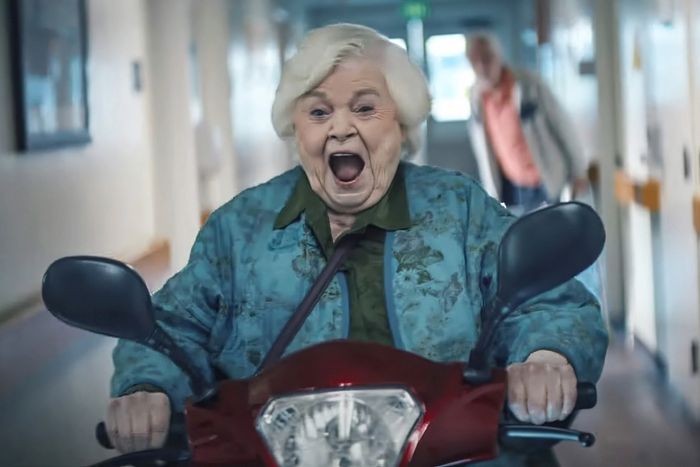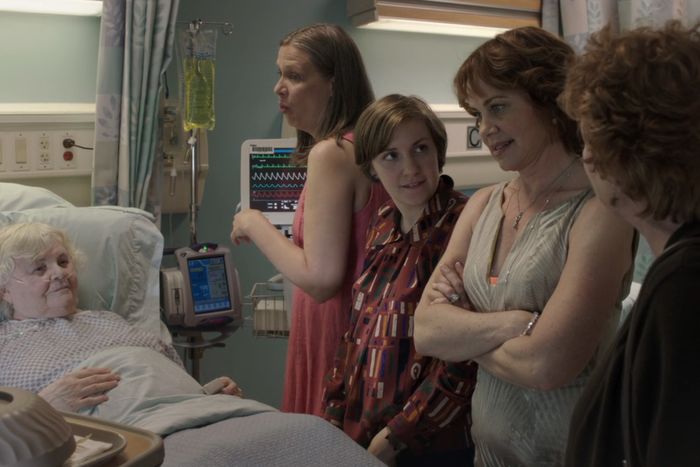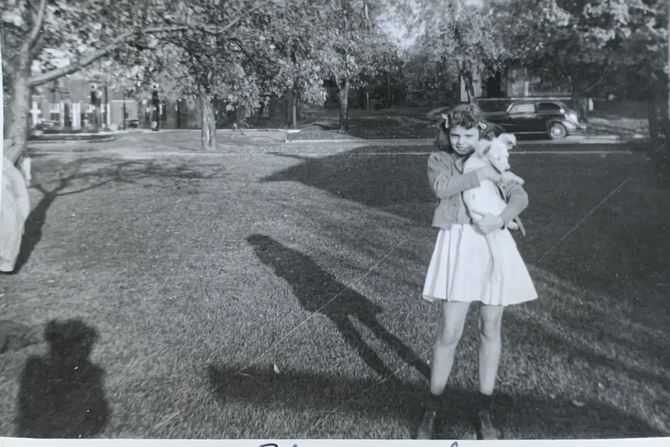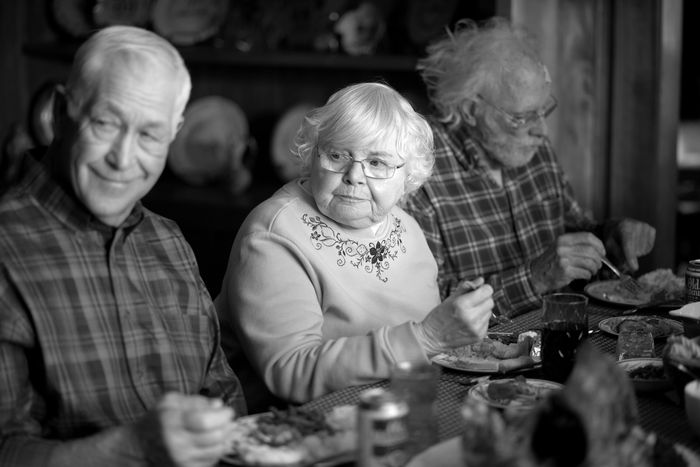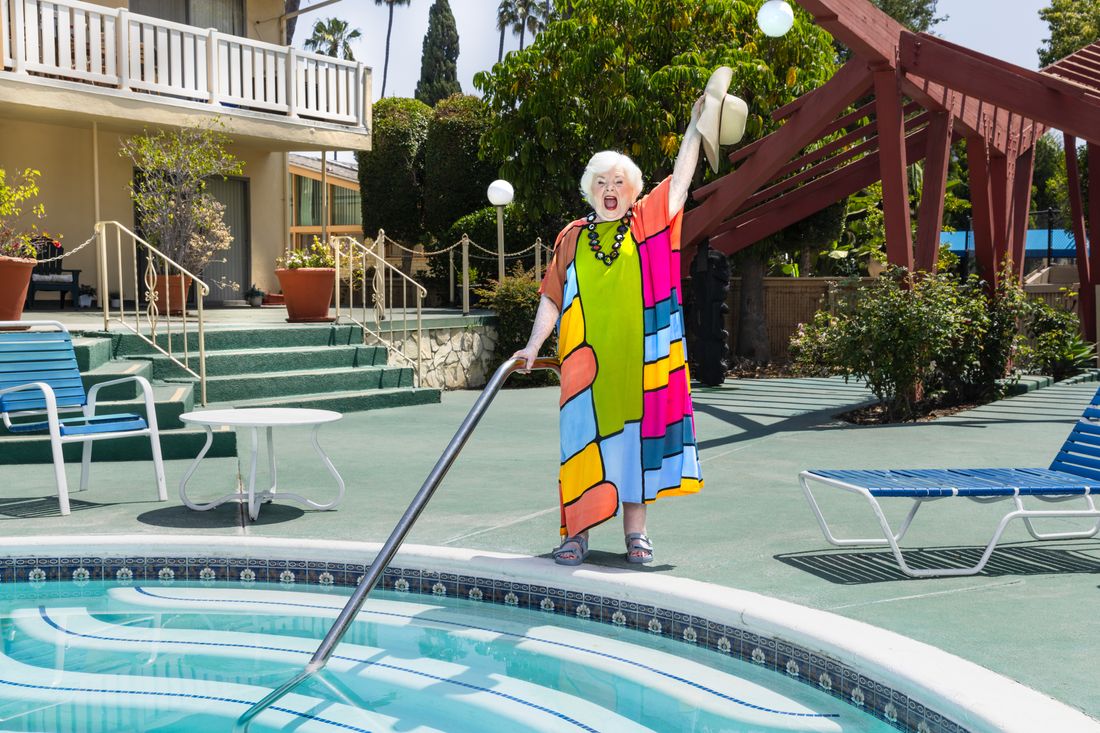
This article was featured in One Great Story, New York’s reading recommendation newsletter. Sign up here to get it nightly.
June Squibb, 94, is driving me around the parking lot of her Sherman Oaks apartment complex on a bright-red, three-wheeled, two-person mobility scooter, her white hair fluttering in the late-May breeze. The complex, where she has lived for 20 years, is so adorable that it is almost violent to behold — a kitschy, 1950s-style, Hawaii–meets–Old Hollywood fever dream, crumbling a little around the edges but mostly uncannily preserved, as though Bing Crosby might emerge from behind a palm tree at any moment and offer you a midday stinger. Squibb, in a green L.L.Bean cargo jacket over a colorful striped top, is cheerful and calm as she pilots the gigantic craft at ten mph, proudly pointing out the attractions: the rock-pile “volcano” that spurts bright-blue water (“The blue lagoon!”), one of the five pools where she swims to keep fit whenever she can, the recording studio where she once did a podcast “just talking about me, basically.”
A cartoonishly handsome stunt coordinator named Ryan Sturz runs along next to us at a healthy clip, making sure Squibb doesn’t fall off. Squibb met Sturz on the set of Thelma, a warm and moving comedy about a Jewish grandma who gets phone-scammed out of $10,000 and, much to the anxiety of her close-knit family (played by Parker Posey, Clark Gregg, and Fred Hechinger, all operating at their peak), sneaks off on a renegade quest across Los Angeles to retrieve her money and her dignity. It was a huge hit out of Sundance earlier this year, inciting a bidding war that was ultimately won by Magnolia, which will release the movie in theaters on June 21. It’s the first time Squibb — who has worked consistently in theater, TV, and film since the early 1950s and earned her only Oscar nomination for a supporting part in 2013’s Nebraska at the age of 84 — has ever been cast in a lead role.
Many of her mid-career parts have poked fun at the gap between the stereotypical image of an affable older woman and the defiant, irrepressible feisty person Squibb actually is. She’s often cast as a gentle-seeming lady who might rip a bong or tell someone to go fuck themselves. She has played mother to Larry David, Steve Carell, and Adam Sandler; grandma to Lena Dunham (whom Squibb says was a favorite progeny), Amy Schumer, and a cartoon kid version of Ellen DeGeneres; confidante to Blythe Danner and Margo Martindale; wife to Jack Nicholson and Bruce Dern; and Queen Elizabeth II for about a minute in the tennis mockumentary 7 Days in Hell. “I always loved what I was doing,” she says of these supporting parts. “I just wanted to work. And I think it’s true that as you work, the more you work — not always but most of the time — the roles do get bigger.”
Squibb smoothly navigates a series of tight turns on the scooter. When we jolt a little bit on an unexpected speed bump, I reflexively reach forward to steady her, but she just chuckles. Sturz trained her on this scooter in this parking lot back in 2023. (In Thelma, she steals the scooter from her friend, played by the late Richard Roundtree, and the two set out for revenge together.) But she hasn’t been back on the proverbial horse since filming last year. Writer-director Josh Margolin wrote the role of Thelma based on his own grandma, who’s now nearly 104 and still kicking, and with Squibb in mind. He slipped her the script via mutual friend Beanie Feldstein, who starred alongside her in A24’s The Humans, and prayed. If Squibb said “no,” “there wasn’t really a plan B,” Margolin tells me.
Luckily, she understood the part of a loving grandmother and friend who’s also stubborn and proudly self-sufficient, refusing to let age limit her. “I knew immediately where she was coming from and why,” Squibb says. At the beginning of production, everyone involved was nervous about letting her take the wheel, rather than having a stunt double do it, for obvious and insurance reasons. “When I first saw the bike, I think my quote must have been something like ‘Fuck no,’” says Zoë Worth, one of the film’s producers. But Squibb, who fears very little and placidly tells me later that she has, for the entirety of her long life, “refused to be told ‘no,’” convinced them that not only would she be driving herself, she would also be doing most of her own stunts. Ultimately, as Worth puts it, “her comfort made us comfortable,” and by the end of filming, Squibb was joyously ramming her scooter into Roundtree’s.
We scoot a little ahead of Sturz, heading for Squibb’s place in the complex. She makes another sudden renegade move, turning to go against parking-lot traffic. A car cruises slowly by, and its driver rolls down the window. “Hey, June! Look at you! You go, girl!” he says. Squibb laughs politely. “Oh, that’s funny,” she says as he drives away. “I don’t know who that is.” Squibb is something of an unofficial mascot for her apartment complex. A recent residents’ newsletter features her prominently with a headshot and bio pulled straight from Wikipedia listing her dozens of credits. “We have been told — this is funny — that they tell people who come to rent that I live here,” she says. As we near her apartment, a toddler yells for “Gammy June.” It’s her neighbor’s kid, she says, and they’re best friends: “He loves candy and ice cream, and so do I.”
Squibb parks the scooter near her unit and gracefully dismounts. We walk into her cozy two-bedroom, which feels exactly like your grandma’s save for the specific contents of the collage wall over the kitchen table: Squibb on Jimmy Kimmel, a framed sketch of her Oscars dress, close-ups from a few of her films, and red-carpet photos from her trip to the Cannes Film Festival for Nebraska, in which she plays foulmouthed ballbuster Kate. She leads me around her living room, showing me her bookshelf stacked with Scandi mysteries (she loves Jo Nesbø), the couch where she mainlines SVU and all three of CBS’s FBI shows (her friends know not to call on Tuesday nights), and various pieces of paraphernalia from her films, including a mini LEGO version of her lead character in Scarlett Johansson’s upcoming directorial debut, Eleanor the Great, which was also written with Squibb in mind. She’s pulling double duty in theaters right now as the voice of Nostalgia in Inside Out 2, and offhandedly mentions that right after filming Johansson’s movie, she “dragged herself to New Jersey for one day” to do a cameo in American Horror Story because she couldn’t imagine turning down the part of a “blood-drinking leprechaun with glaucoma.” (“We can only drink the blood of bad people. There’s an ethic in there.”)
Squibb is most excited to show me her rescue cats: Billy Bob, whom she first saw in a photo “where he had this look like he was just telling the whole world, ‘Fuck off, all of you,’” and Mr. Rose, whom Squibb’s son Harry’s partner found outside a Whole Foods in San Diego. They named the then-sickly tabby Rose before a vet informed them the cat was male. “If I get really pissed off at him,” Squibb says, “I go, ‘Mr. Rose, will you stop that?’”
Over the course of our few hours together, it becomes increasingly clear that Squibb is an unintentionally powerful magnet for animals and humans alike, a person of quiet, unshowy generosity who accidentally makes devoted lifelong friends simply by being who she is. Her Thelma co-star Hechinger, 24, comes over for dinner regularly since the movie wrapped, sometimes unannounced. She’s still best friends with Chris Colfer, who played opposite her in an episode of Glee a decade ago when he was 23 and she was 84. He wrote the episode and suggested the series cast her specifically because he “adored her in Nebraska.” Last Christmas, Colfer attended Squibb’s annual party with around 25 other people, including his sister, his partner, and his partner’s mother and father from Florida. “She’s always right in the center of the room, almost kind of like the Godfather,” Colfer says of Squibb. “Everyone kind of goes and bows and pays their respects, and they sit around her and just listen to stories and laugh.”
Squibb says she has always been like this — as bighearted as she is full of unperturbed self-belief, the sort of woman they used to call a pistol. Growing up in Vandalia, Illinois, as a preternaturally talented tap dancer who knew near-instantaneously that she would grow up to be an actor, she was a “tough kid” who took so little shit that she actually quit kindergarten. “All they did was take naps and eat cookies,” she says, rocking gently next to me on her backyard patio swing. “And I just thought that was pretty dumb.” Her mom and dad, a silent-film pianist and an insurance agent, respectively, told her she “had to get out of it herself.” She went next door to her grandma’s house, where there was a telephone, called the school, and said, “This is June Squibb, and I’m not coming back.” She didn’t until first grade.
At 19, she moved to Cleveland, where she performed in musicals and comedies at the Cleveland Play House. As she puts it, she “did some very interesting work there, but it was never like, ‘Oh, she’s a star.’ I don’t think I was ever their choice for who was going to make it in New York.” But it was in Cleveland where she realized she was both funny and more of a character actor, a distinction she proudly makes to this day. Part of what makes her style of comedy so delightful to watch is that she plays every bit completely grounded. “I never think funny,” she explains, contrasting herself with friends like Dom DeLuise and Ruth Buzzi. “They think funny, and I don’t. I work from an acting standpoint. I’m thinking about it as reality; the character’s as real as can be to me.” In one scene in Thelma, for example, Squibb takes the scooter on a brief detour to an old friend’s house and Roundtree asks why they’re stopping by. “To get a gun,” she says, entirely matter-of-factly. “Couple of schmegegges like us turning up unannounced? I like to be prepared.”
In 1957, Squibb headed to New York City, where she did, in fact, make it, and stayed for nearly five decades, putting on hundreds of plays — on Broadway, Off (and Off–Off) Broadway, at cabarets, in nightclubs, on cruise ships. To make some extra money, she posed for “awful, tacky magazines” and romance novels. “But it was wonderful. I mean, I was happy,” she says. Her break came in the form of a 1958 musical called The Boy Friend — “that sort of got people wanting to know who June Squibb is,” she says — though she adds that journalists who have written about her tend to emphasize her role as a stripper in Broadway’s Gypsy alongside Ethel Merman. “I got that role with a walk I did. Sort of a hitch,” she says grinning. “It just took the house down.”
In her limited time off, she was “raising hell in New York.” I press her for details, and she laughs mischievously. “I was working a lot, but there was always a gentleman in my life. Always. Oh God, it was lovely —” she catches herself and gives me a dangerous look. “What am I talking about?” Squibb married twice and had a child with her second husband, director and acting teacher Charles Kakatsakis. “I grew up when women were supposed to be getting married and having kids and the whole thing,” she says. “My mother saw me on Broadway performing, and afterwards said, ‘Well, now you can come back home and get married and have kids.’ But I was 40 when I had Harry. I’ve never done what anybody told me I should do.”
Except for Kakatsakis, whom Squibb credits with teaching her how to quiet down her theatrical acting and dial into the projection of realism for which she’s now known. The two met in their early 40s doing stock-company work, playing opposite one another in How to Succeed in Business Without Really Trying. “I was playing the blonde bimbo, and he was playing the Rudy Vallée part,” she says. “And he told me from the beginning, ‘You could be a really fine actress.’” When Kakatsakis died in 1999 from a stroke and heart attack, “it was very difficult,” she says plainly, her eyes on mine as she pushes the porch swing with her legs. “But I think as women, we depend upon men so often and so much. And when we don’t, we find strengths that we didn’t know we had.”
In her early 60s, Squibb looked around and noticed that more films were being shot in New York and that everyone around her was getting parts in them. She told her agent to start booking her some auditions and found herself playing a maid in Woody Allen’s Alice. During one scene, her co-star, William Hurt, kept changing the line that cued Squibb’s action in the scene. “Woody started yelling at me,” she says, “and I had just had it. And I yelled back, ‘I can’t get the cue.’ I went home and I told my husband, ‘Well, he’s either going to fire me or he is going to love me. I don’t know which.’” It was the latter; when she went back on set, “he had written me into all these scenes.” She continued to book small parts in films like Meet Joe Black, In and Out, and The Age of Innocence. Scent of a Woman director Martin Brest was similarly taken with her, keeping her in the background of key scenes. “He shot me all the time, Martin Brest,” she says. “I don’t know why.”
In 2002, she landed the role of Jack Nicholson’s wife in Alexander Payne’s About Schmidt, dying in the first 30 minutes. That part, however brief, kicked off a move to Los Angeles and decades of guest-starring roles on shows like Curb Your Enthusiasm, House, Two and a Half Men, Just Shoot Me!, Girls, The Office, Shameless, Modern Family, and ER. She credits Payne with giving her career an electrical charge, but even he had to be cajoled into casting her again as Kate in Nebraska. She’d been so convincing as “the little lady from About Schmidt” that he couldn’t see her as the sort of woman who would pull up her skirt to flash the grave site of an old suitor or wittily harangue her delusional husband.
In reality, she says, she is much closer to the character of Kate. “I can be loud,” she says. “I’ve done bitchy things.” (She can’t think of any examples at the moment.) She was so determined to prove to Payne that she did have “a certain strength and a certain grossness” that she sent him a self-tape. He hired her again, and after her Oscar nomination, she says, she never had to audition again. She’s hoping someone will write her into a western next because she has loved the genre since she was a kid.
We head back inside her apartment for lunch. Her neighbor Ana, who cooks for her three times a week, has stopped by with a gigantic platter of 30-plus tacos and guacamole. Squibb is visibly thrilled. Food is one of the many things that bring her joy. She loves going to dinner in her neighborhood with “people that I like, who interest me,” she says. The bar is high. “I get very bored with people,” she explains, before correcting herself, “Men.” That’s part of why she doesn’t date. The other reason: “I don’t have to.” Colfer confirms that “a lot of straight men can’t keep up with her for sure, but she’s got a good gaggle of gays that follow her around everywhere.” She has some close friends nearer her age, too, such as actor and director Yvette Freeman. Otherwise, as Squibb puts it, “everybody’s dead but me.” She misses Roundtree, with whom she bonded on set and who died of fast-moving cancer last year.
She thinks about her own death sometimes. There was a moment on the set of Thelma when she had to pretend to fall — her stunt double, Heidi Pascoe, did the actual falling, but Squibb was flat on the ground for a long time shooting the scene. As she lay there, she felt herself growing emotional. “I just thought, Oh God, what if this happened, if I were down like this? Because that’s so real now,” she says. Margolin’s grandma, also named Thelma, fell like this once in her condo right before she moved in with one of her children; she found her way back up to her feet through “sheer force of will” and simply went about the rest of her day. She “didn’t want to bother us,” recalls Margolin. “She’s spunky,” says Squibb of her character’s namesake. “I mean, the grit and determination in the film is for real.” The Thelmas only recently met. “I walked in and I said, ‘I’m Thelma Post.’ She said, ‘No, I’m Thelma Post,’” Squibb says.
“I’m going to go Thelma,” she concludes, laughing. “I figure if she could make it to 104, I could make it.”



